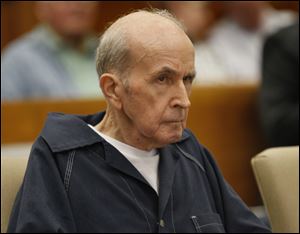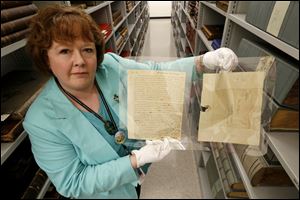
Five Things You Might Have Missed: 7-07
Top articles from this weekend's editions of The Blade
7/7/2014
Oregon Fire Department paramedic Greg Pollauf with Narcan/Naloxone, a drug which can reverse the effects of an opiod overdose.
The Blade/Jetta Fraser
Buy This Image

Oregon Fire Department paramedic Greg Pollauf with Narcan/Naloxone, a drug which can reverse the effects of an opiod overdose.
1. Increased access pushed locally for drug to treat overdoses
As the number of deaths from heroin and prescription drugs escalates in Lucas County and across Ohio, state officials have made it easier for safety workers to fight overdoses with naloxone, or Narcan, which is often called a “miracle” drug.
But in northwest Ohio, very little has been done to move beyond the status quo of using only paramedics — not other emergency responders, police officers, and even patients’ families — to administer the drug.
Narcan is not new.
For more than 40 years, paramedics have administered it to people overdosing and have seen them come back to life. Ohio law was revised in October to allow all first responders and emergency workers with a basic license, including volunteer firefighters and police officers, to give naloxone on the scene of an overdose in an attempt to help stem the tide of drug deaths. READ MORE

Ohio Stadium on the campus of Ohio State University in Columbus.
2. Ohio State's Horseshoe aims to upstage Michigan's Big House
The Big House may no longer be the biggest this fall.
That title could soon belong to — gasp — the Stadium Down South.
While Michigan has reigned as college football’s attendance leader for 39 of the past 40 years, a perfect brew of events has positioned Ohio State to swipe the crown.
At the same time, OSU is bracing for record six-figure crowds at newly renovated Ohio Stadium — one prominent ticket broker calls the Buckeyes the hottest team in the country — Michigan faces its toughest sell in decades. Thousands of past ticket buyers are saying no thanks amid increased prices, decreased results, and a blah home schedule highlighted by a prime-time visit from Penn State.
Most telling is the veering paths of the rivals’ usually most loyal faction: the students. READ MORE

Robinson
3. Toledo priest Gerald Robinson, convicted in nun’s 1980 murder, dies while incarcerated
A Toledo priest convicted of murder in 2006 for the 1980 slaying of a nun died early Friday in a prison hospital.
Father Gerald Robinson, 76, was in hospice at Franklin Medical Center, a Columbus hospital run by the Ohio Department of Rehabilitation and Correction, when he died at 4:15 a.m.
His attorney, Rick Kerger, said an official cause of death had not yet been disclosed.
Robinson had been in the facility for heart problems.
The priest was serving 15 years to life in prison for the slaying of Sister Margaret Ann Pahl, who was killed on April 5, 1980 — a day before Easter and a day before she would have turned 72. READ MORE
Father Robinson to have diocesan funeral
Despite his 2006 conviction for a nun’s murder, Gerald Robinson will be given a normal funeral befitting a diocesan priest, the Roman Catholic Diocese of Toledo announced Saturday.
“Whether in the eyes of God, Father Robinson was or was not guilty of the crime, I do not know,” the Rev. Charles Ritter, the diocesan administrator, said in the statement. “I do know that he is the work of God’s hands, as are we all. He was a sinner, as are we all. He was a baptized member of the body of Christ, and he was, and remains an ordained priest of the Roman Catholic Church. This is the context in which his funeral will take place.”
The arrangements themselves remain to be made. READ MORE

The Andersons headquarters, 480 West Dussel Drive in Maumee.
4. The Andersons goes shopping for new headquarters location
After 34 years at its present location in Maumee’s Arrowhead Industrial Park, The Andersons Inc. is looking for a new home.
The Fortune 500 company confirmed on Thursday that it is shopping for a site on which to build a replacement headquarters because space at its 480 W. Dussel Dr. site has been maxed out and the 103,000-square-foot building has no possibility of expansion.
The company, which posted a profit of $89.9 million in 2013 on revenues of $5.6 billion, plans to stay in northwest Ohio and prefers the metro Toledo area.
But where The Andersons might go, and when are unknown.
The company has been tight-lipped about its plans. READ MORE

Jill Clever, manager of the Local History and Genealogy Department at the Toledo-Lucas County Public Library, holds an original letter and envelope written by Thomas Jefferson.
5. Jefferson’s letter offers rare glimpse into his personal life
It had been nearly 24 years since the signing of America’s Declaration of Independence. But by 1800, Thomas Jefferson, the author of that document, had come to realize carrying through on those ideals would be more difficult then he ever could have imagined.
The conservative Federalist Party, under the leadership of President John Adams, was in power at the time and had plunged the country into a multimillion dollar deficit by continuing to build a larger, more powerful military, said Bruce Way, a professor of history at the University of Toledo. The 5th U.S. Congress had also passed the Alien and Sedition Acts which, among other things, prohibited any speech that was critical of the federal government.
These actions were things Mr. Jefferson was strongly opposed to, as he made clear in the Declaration of Independence. He believed that people should have the right to express their opinions and did not believe the federal government should be all-powerful; instead he believed the individual states should be able to govern themselves.
Mr. Jefferson, a Democratic-Republican and the vice president at the time, expressed his frustration at not being able to do anything to oppose these laws in a personal letter dated March 8, 1800, to his son-in-law John Wayles Eppes — a letter that has been in the possession of the Toledo-Lucas County Public Library for that last 136 years. READ MORE
Toledo library unveils a rare letter from Thomas Jefferson from THE BLADE on Vimeo.